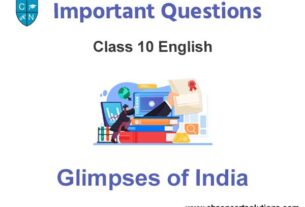Please refer to Nelson Mandela: Long Walk to Freedom Class 10 English Important Questions given below. These solved questions for Nelson Mandela: Long Walk to Freedom have been prepared based on the latest CBSE, NCERT and KVS syllabus and books issued for the current academic year. We have provided important examination questions for Class 10 English all chapters.
Class 10 English Nelson Mandela: Long Walk to Freedom Important Questions
Short Answer Type Questions
Question. Who all took oath of office along with Nelson Mandela?
Ans. Along with Nelson Mandela taking oath as the first Black President of South Africa, Mr. de Klerk was sworn in as second Deputy President and Thabo Mbeki was sworn in as first Deputy President.
Question. What did the display of air power at the ceremony demonstrate?
Ans. The spectacular array of South African jets, helicopters and troop carriers not only displayed pinpoint precision and military force but also demonstrated the military’s loyalty to democracy to a new government that had been freely and fairly elected.
Question. Which event symbolised the day for Nelson Mandela?
Ans. The day was symbolised for Mandela by playing the two national anthems where the whites were singing ‘Nkosi Sikelel—iAfrika’ and blacks were singing ‘Die Stem’, the old anthem of the Republic.
Question. What does the author say of the country in the beginning of his oath-taking speech? What promise does he make?
Ans. The author thanks all the international guests. They have come to take possession of the country. It is the common victory for justice. It is also meant for peace and human dignity. At last they have got political freedom. He promises that the country shall not again experience the oppression of one by another.
Question. Why did Nelson Mandela said, “The oppressed and the oppressor alike are robbed of their humanity.”
Ans. Nelson Mandela said so because the oppressed were robbed, when they suffered all that was against humanity and the oppressor had to kill the good human being within himself before doing anything cruel to the other person.
Question. What Mandela meant when he is simply the sum of all those African patriots who had gone before him?
Ans. Nelson Mandela was a patriot. Like all other patriots, he felt the need of political independence and also underwent tortures by the whites of his own country. He included three persons in his list who were role model for him.
Question. What are the twin obligations Nelson Mandela talks about in his speech ?
Ans. According to Nelson Mandela, every man has twin obligations—one is towards his family and the other is towards his people and his country. But in the reign of Apartheid if one tried to fulfill his duty towards his people, he was ripped off with his family and home.
Question. What is the dream of Nelson Mandela for the future of South Africa ?
Ans. Mandela dreamt that his country should be free from poverty and discrimination. No country man should be oppressed on the basis of colour and creed. He wished the Sun of freedom to shine on his country forever.
Long Answer Type Questions
Question. Do you think there is a discrimination based on caste and colour of skin in our country? If yes, suggest ways to eradicate it.
Ans. Yes, there is a discrimination in our country based not only on caste and colour of the skin but also on gender. Caste system is an age-old practice put in place in the ancient society demarcating the people on the basis of the work they did. Since ages, people of low-caste have been treated without dignity and compassion. Often, the treatment meted out to lowcaste humans was worse than the treatment of animals. Though in modern times, this has decreased considerably. People still harbour feelings of caste supremacy. Gender discrimination is also prevalent and so is the difference in treatment based on your skin colour. All these can be eradicated by education. Higher rates of literacy will ensure no discrimination in our society. There will be dignity of labours and all people will be treated equally as our constitution has prescribed.
Question. Man is a social animal. He has some obligations to society. What twin obligations does Mandela mention? How can one fulfil these obligations?
Ans. Man is a social animal and has some social obligations to society. Nelson Mandela understood the importance of being social. Mandela talked about twin obligations of a man—obligation to his family,to his parents, to his wife and children. This is the first and the most important obligation that every man has to fulfil in his life. Another obligation is to his people, to his community and to his nation. He emphasises that in a civil society, each one of us should fulfil these obligations. It is the responsibility of the government to provide a conducive atmosphere where a person can fulfil these obligations. But in a country like South Africa, it was not possible to fulfil these obligations because of discrimination. It was an era of oppression and torture for the black Africans in their own country. They were not even allowed the basic freedom of living a dignified life.
Question. It was only when I began to learn that my boyhood freedom was an illusion, when I discovered as a young man that my freedom had already been taken from me, that I began to hunger for it. At first, as a student, I wanted freedom only for myself, the transitory freedoms of being able to stay out at night, read what I pleased and go where I chose.
(a) Which freedoms does Mandela talk about at first? Why was his childhood freedom an illusion?
(b) Give the meaning of transitory.
Ans. (a) Mandela speaks very eloquently about the freedoms he had as a child. The freedom to run in the fields, eat what he wanted and to swim in the streams. He felt the racial divide in the bigger cities. He was bound by laws where he could not make friends, marry or earn a keep according to his wishes. Thus, he realized that his childhood freedom was an illusion.
(b) Transitory means temporary, or for a short while.
Question. How did the desire for the freedom of his people change Nelson Mandela’s life ?
Ans. The desire for the freedom of his people totally animated Nelson Mandela’s life. He was transformed from a frightened young man to a bold one. The desire turned a law abiding attorney to a criminal. A familyloving husband was turned into a man without a home, changed a life-loving man into a monk. Mandela was no more virtuous as self sacrificing, but he could not even enjoy poor and limited freedom. He felt himself robbed when he came to know that his people were not free. He felt the slavery of his people as slavery of his own. It was this desire for the freedom of his people to live their lives with dignity and selfrespect that changed his life. He was allowed freedom when he knew his people were not free. Freedom was indivisible. The chains on anyone of his people were the chains on all of them, the chains on all his people were the chains on him also. He felt the pain and fought for them.



